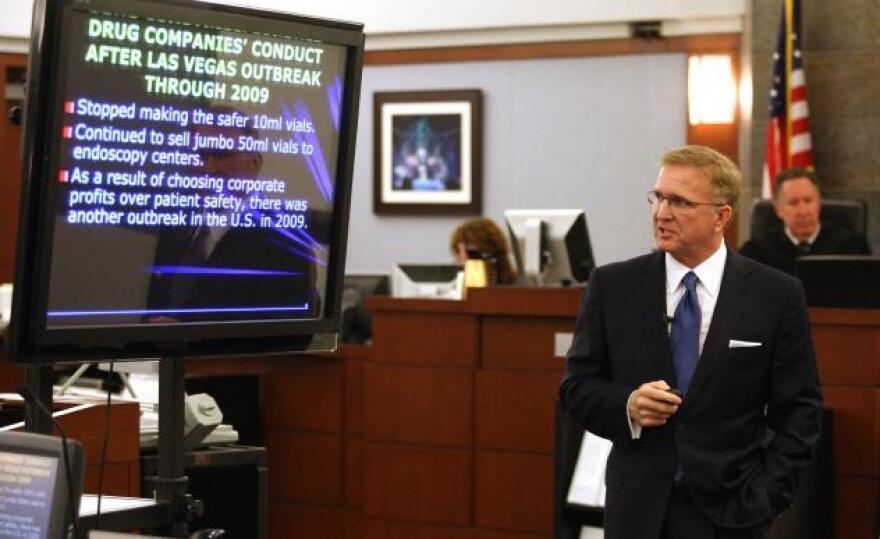The private attorney representing Clark, Washoe and several other Nevada counties in suing drug manufacturers says it will take decades to address the legacy of the opioid epidemic.
Las Vegas attorney Rober Eglet told State of Nevada that “this public nuisance needs to be abated, and it’s going to take decades to get done. And it’s going to take money every year for the abatement.”
Eglet, who was hired by counties across the state, is seeking more than $4 billion in the lawsuits he has filed.
He said a recent $572 million judgment against Johnson & Johnson in Oklahoma — and a jump in the company’s stock price on the news — showed how big the financial stakes are.
“The verdict was a lot less than their analysts expected, the company expected. They did better than thought they would,” he said. “It just goes to show you these companies know what’s coming.”
Eglet predicted a Sept. 17 hearing would bring new revelations about makers of prescription opioids, which have been blamed for at least 250 deaths in Nevada in each of the last 15 years.
“The public will finally get to understand the depths and the widths of how bad this problem is and the unbelievable corporate indifference and greed that was going on when it comes to why this opiate epidemic happened in the first place,” he said.
And while Oklahoma's case garnered headlines, Eglet said Nevada's opiate problem is worse than Oklahoma's even though that state has a larger population.
“What it means is the drug companies were shipping a lot of these opiates into Nevada," he said, "Our state has the fourth-worst problem as far as the number of opiates being shipped in here per capita.”
He also said the Silver State had the 4th highest overdose death rate in the country and the 2nd highest per capita number of oxycodone and hydrocodone pills being shipped to the state.
According to court documents, in Clark County between 2006 and 2012, 1.3 billion doses were prescribed. In Washoe County, that number was 180 million. That’s nearly 1.5 billion doses for two counties with well under 3 million in combined population--roughly 50 pills per person.
Eglet said the pharmaceutical industry fought to keep those numbers confidential for years but new information coming out in court cases across the country show the companies knew they were addicting the American public but they didn't care because they were making billions of dollars a year.
“They were putting profits over patients and sales over safety,” he said.
And while the number pills shipped to Washoe and Clark County are stunning, the numbers for rural counties seem even more startling.
Mineral County, which is between Carson City and Las Vegas, has fewer than 5,000 residents. But from 2006 to 2012, 2.5 million opioid doses were prescribed there. In Nye County, same time period, 34 million doses for 43,000 people—that's a whopping 790 pills, on average, per person.
Eglet said while opioids were and continue to be a problem for rural areas, the numbers show the bigger problem was diversion, which is when pills are moved from the legal market to the illegal market.
“The simple scenario is they go in the front door," he said, "They’re shipped in the front door from distributors and manufacturers into the pharmacies and then a large number of those pills go out backdoor into the illicit market.”
Eglet has litigated many personal injury cases and cases against other pharmaceutical companies, including in the infamous case of hepatitis C in Las Vegas that was spread through a colonoscopy clinic.
But he told KNPR's State of Nevada that he has never seen corporate conduct as egregious as in the opioid cases.
He said as the cases in Nevada and elsewhere unfold the American public will start to understand just how serious the problem was and continues to be.
“Once the American public really learns about all of this, I can’t imagine the American public isn't going to be crying for some of these people to go to prison,” he said.
Robert Eglet, attorney, suing drug makers








